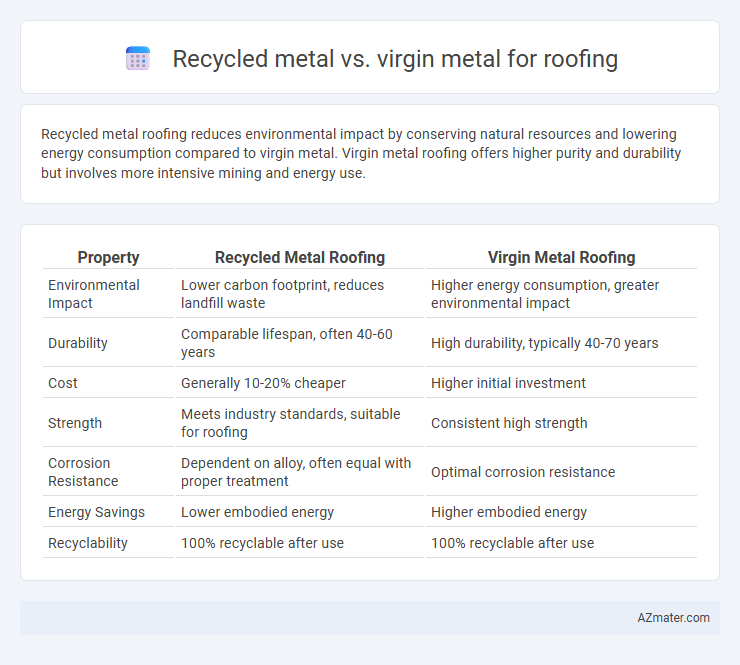Recycled metal roofing reduces environmental impact by conserving natural resources and lowering energy consumption compared to virgin metal. Virgin metal roofing offers higher purity and durability but involves more intensive mining and energy use.
Table of Comparison
| Property | Recycled Metal Roofing | Virgin Metal Roofing |
|---|---|---|
| Environmental Impact | Lower carbon footprint, reduces landfill waste | Higher energy consumption, greater environmental impact |
| Durability | Comparable lifespan, often 40-60 years | High durability, typically 40-70 years |
| Cost | Generally 10-20% cheaper | Higher initial investment |
| Strength | Meets industry standards, suitable for roofing | Consistent high strength |
| Corrosion Resistance | Dependent on alloy, often equal with proper treatment | Optimal corrosion resistance |
| Energy Savings | Lower embodied energy | Higher embodied energy |
| Recyclability | 100% recyclable after use | 100% recyclable after use |
Overview: Recycled Metal vs Virgin Metal Roofing
Recycled metal roofing offers significant environmental benefits by reducing energy consumption and landfill waste compared to virgin metal, which requires extensive mining and processing. Virgin metal roofing provides high durability and structural integrity but involves higher carbon emissions during extraction and production. Both materials deliver long-lasting performance, yet recycled metal roofing promotes sustainable construction practices by utilizing previously processed materials.
Environmental Impact of Recycled vs Virgin Metal
Recycled metal roofing significantly reduces environmental impact by lowering energy consumption and decreasing greenhouse gas emissions compared to virgin metal extraction and processing. Using recycled metals conserves natural resources, minimizes mining waste, and cuts down on landfill use, promoting sustainable roofing solutions. Lifecycle assessments consistently show that recycled metal roofing achieves up to 95% less energy use and emits substantially fewer pollutants than virgin metal alternatives.
Cost Comparison: Recycled and Virgin Metal Roofs
Recycled metal roofing generally costs 10-30% less than virgin metal due to lower raw material expenses and reduced energy consumption during production. Virgin metal roofs offer higher initial durability and uniformity but come with premium prices reflecting mining and refining complexities. Budget-conscious homeowners often prefer recycled metal for eco-friendly savings without compromising performance.
Durability and Lifespan Differences
Recycled metal roofing offers comparable durability to virgin metal but may contain slight variations in alloy composition that can affect long-term corrosion resistance. Virgin metal roofing typically exhibits a longer lifespan, often exceeding 50 years, due to its consistent purity and structural integrity. Both options provide excellent resilience, but virgin metals generally maintain superior performance under harsh environmental conditions.
Energy Efficiency in Metal Roofing
Recycled metal roofing significantly reduces energy consumption by requiring up to 95% less energy to produce compared to virgin metal, making it a sustainable choice for eco-friendly construction. The energy-efficient properties of recycled metal also contribute to lower carbon emissions during manufacturing, aligning with green building standards. Furthermore, metal roofs made from recycled materials often retain superior thermal reflectivity, enhancing insulation and reducing cooling costs in residential and commercial buildings.
Aesthetic Options and Finishes
Recycled metal roofing offers a wide range of aesthetic options and finishes that closely mimic virgin metal, including smooth, galvanized, and painted surfaces tailored to match architectural styles. Virgin metal, however, provides greater uniformity and a broader spectrum of specialty finishes such as custom colors, embossed patterns, and advanced coatings for enhanced durability and visual appeal. Both materials support modern roofing design trends, but virgin metal often allows for more precise control over texture and shine, ideal for premium or highly customized installations.
Installation Process and Considerations
Recycled metal roofing requires careful inspection for contaminants and uniformity before installation to ensure durability and proper fitting, while virgin metal offers consistent quality and easier handling due to its standardized manufacturing. Installation of recycled metal may involve additional measures like surface treatment or custom cutting, increasing labor time compared to the straightforward process of virgin metal panels. Considerations include potential variability in recycled metal thickness and coating, which can affect fastening methods and long-term performance in roofing applications.
Recyclability and End-of-Life Factors
Recycled metal roofing offers significant environmental advantages due to its high recyclability, often containing up to 90% recycled content, which reduces the demand for virgin metal mining and conserves natural resources. Virgin metal, while durable, requires extensive mining and energy-intensive processing, contributing to higher carbon emissions and environmental degradation during its lifecycle. At the end of life, recycled metal roofing can be fully reprocessed without quality loss, promoting a circular economy, whereas virgin metal roofing, once discarded, generally undergoes the same recycling process but initially bears a larger ecological footprint.
Maintenance Requirements: Recycled vs Virgin
Recycled metal roofing typically requires less maintenance due to its enhanced resistance to corrosion and weathering, as it often undergoes treatments that increase durability. Virgin metal roofs, while strong, may need more frequent inspections and protective coatings to prevent rust and degradation over time. Choosing recycled metal offers lower long-term maintenance costs and sustainability benefits without compromising structural integrity.
Choosing the Best Metal Roofing Option
Recycled metal roofing offers superior environmental benefits by reducing mining waste and energy consumption compared to virgin metal, making it an eco-friendly choice. Virgin metal roofing provides enhanced structural integrity and long-term durability, often preferred for heavy-duty applications and extreme weather resistance. When choosing the best metal roofing option, weigh the sustainability of recycled metal against the strength and longevity of virgin metal to match specific project needs and budget constraints.

Infographic: Recycled metal vs Virgin metal for Roofing
 azmater.com
azmater.com